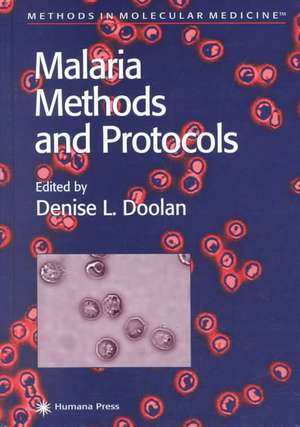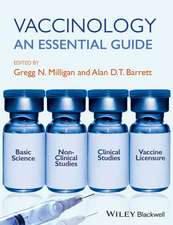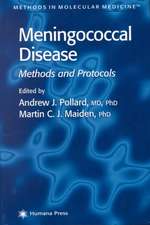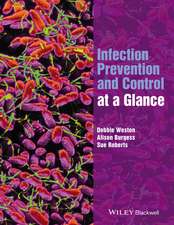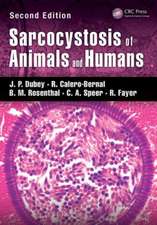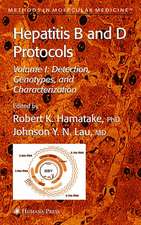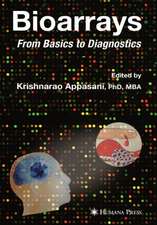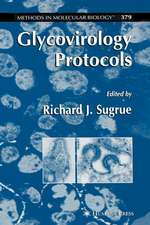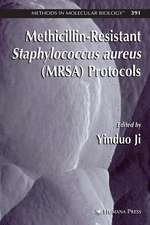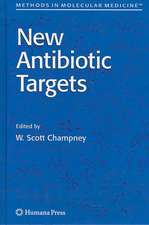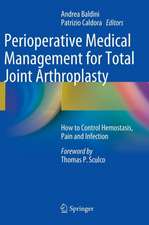Malaria Methods and Protocols: Methods in Molecular Medicine, cartea 72
Editat de Denise L. Doolanen Limba Engleză Hardback – 28 iun 2002
| Toate formatele și edițiile | Preț | Express |
|---|---|---|
| Paperback (1) | 807.69 lei 6-8 săpt. | |
| Humana Press Inc. – 9 noi 2010 | 807.69 lei 6-8 săpt. | |
| Hardback (1) | 1128.47 lei 6-8 săpt. | |
| Humana Press Inc. – 28 iun 2002 | 1128.47 lei 6-8 săpt. |
Din seria Methods in Molecular Medicine
- 5%
 Preț: 1278.74 lei
Preț: 1278.74 lei - 15%
 Preț: 655.78 lei
Preț: 655.78 lei - 5%
 Preț: 1106.50 lei
Preț: 1106.50 lei - 5%
 Preț: 727.44 lei
Preț: 727.44 lei - 5%
 Preț: 1108.72 lei
Preț: 1108.72 lei - 15%
 Preț: 650.55 lei
Preț: 650.55 lei - 5%
 Preț: 735.66 lei
Preț: 735.66 lei - 18%
 Preț: 947.35 lei
Preț: 947.35 lei - 18%
 Preț: 948.92 lei
Preț: 948.92 lei - 5%
 Preț: 1114.54 lei
Preț: 1114.54 lei - 5%
 Preț: 1114.91 lei
Preț: 1114.91 lei - 15%
 Preț: 658.55 lei
Preț: 658.55 lei - 5%
 Preț: 734.01 lei
Preț: 734.01 lei - 5%
 Preț: 1111.61 lei
Preț: 1111.61 lei - 5%
 Preț: 1104.32 lei
Preț: 1104.32 lei - 5%
 Preț: 723.21 lei
Preț: 723.21 lei - 5%
 Preț: 1106.13 lei
Preț: 1106.13 lei - 5%
 Preț: 723.05 lei
Preț: 723.05 lei - 5%
 Preț: 1108.35 lei
Preț: 1108.35 lei - 5%
 Preț: 723.42 lei
Preț: 723.42 lei - 5%
 Preț: 1115.65 lei
Preț: 1115.65 lei - 5%
 Preț: 786.86 lei
Preț: 786.86 lei - 5%
 Preț: 1133.01 lei
Preț: 1133.01 lei - 5%
 Preț: 1114.71 lei
Preț: 1114.71 lei
Preț: 1128.47 lei
Preț vechi: 1187.85 lei
-5% Nou
Puncte Express: 1693
Preț estimativ în valută:
215.93€ • 226.06$ • 178.67£
215.93€ • 226.06$ • 178.67£
Carte tipărită la comandă
Livrare economică 05-19 aprilie
Preluare comenzi: 021 569.72.76
Specificații
ISBN-13: 9780896038233
ISBN-10: 0896038238
Pagini: 631
Ilustrații: XV, 631 p.
Dimensiuni: 178 x 254 x 39 mm
Greutate: 1.27 kg
Ediția:2002
Editura: Humana Press Inc.
Colecția Humana
Seria Methods in Molecular Medicine
Locul publicării:Totowa, NJ, United States
ISBN-10: 0896038238
Pagini: 631
Ilustrații: XV, 631 p.
Dimensiuni: 178 x 254 x 39 mm
Greutate: 1.27 kg
Ediția:2002
Editura: Humana Press Inc.
Colecția Humana
Seria Methods in Molecular Medicine
Locul publicării:Totowa, NJ, United States
Public țintă
ResearchCuprins
Assessing Risk of Infection and Severity of Disease.- Vector Incrimination and Entomological Inoculation Rates.- Epidemiological Measures of Risk of Malaria.- Laboratory Models.- Maintenance of the Plasmodium berghei Life Cycle.- Mouse Models for Pre-Erythrocytic-Stage Malaria.- Mouse Models for Erythrocytic-Stage Malaria.- Nonhuman Primate Models.- Nonhuman Primate Models.- Diagnosis and Typing.- Vector Analysis.- Genotyping of Plasmodium spp..- Genotyping of Plasmodium falciparum.- Microsatellite Analysis in Plasmodium falciparum.- Quantitation of Liver-Stage Parasites by Automated TaqMan® Real-Time PCR.- Quantitation of Liver-Stage Parasites by Competitive RT-PCR.- Molecular Biology Techniques.- Extraction and Purification of Plasmodium Total RNA.- Extraction and Purification of Plasmodium Parasite DNA.- Southern Blotting of Parasite DNA.- SDS-PAGE and Western Blotting of Plasmodium falciparum Proteins.- Nested PCR Analysis of Plasmodium Parasites.- RFLP Analysis.- Analysis of Gene Expression by RT-PCR.- In Situ Detection of RNA in Blood- and Mosquito-Stage Malaria Parasites.- Purification of Chromosomes from Plasmodium falciparum.- Construction of Genomic Libraries from the DNA of Plasmodium Species.- Construction of a Gene Library with Mung Bean Nuclease-Treated Genomic DNA.- Construction of Plasmodium falciparum ? cDNA Libraries.- Production of Stage-Specific Plasmodium falciparum cDNA Libraries Using Subtractive Hybridization.- Construction and Screening of YAC Libraries.- Episomal Transformation of Plasmodium berghei.- Gene Targeting in Plasmodium berghei.- Immunological Techniques.- Peptide Vaccination.- DNA Vaccination.- Assessing Antigen-Specific CD8+ and CD4+ T-Cell Responses in Mice After Immunization with Recombinant Viruses.- Assessing CD4+HelperT-Lymphocyte Responses by Lymphoproliferation.- Limiting Dilution Analysis of Antigen-Specific CD4+ T-Cell Responses in Mice.- Cell Trafficking.- Assessing Antigen-Specific Proliferation and Cytokine Responses Using Flow Cytometry.- Cytokine Analysis by Intracellular Staining.- Assessment of Antigen-Specific CTL- and CD8+-Dependent IFN-? Responses in Mice.- Assessing Antigen-Specific CD8+ CTL Responses in Humans.- Human Antibody Subclass ELISA.- Systemic Nitric Oxide Production in Human Malaria.- Systemic Nitric Oxide Production in Human Malaria.- Cell Biology Techniques.- In Vitro Culture of Plasmodium Parasites.- Automated Synchronization of Plasmodium falciparum Parasites by Culture in a Temperature-Cycling Incubator.- Hepatic Portal Branch Inoculation.- Hepatocyte Perfusion, Isolation, and Culture.- Inhibition of Sporozoite Invasion.- Inhibition of Liver-Stage Development Assay.- T-Cell Mediated Inhibition of Liver-Stage Development Assay.- Antibody-Dependent Cellular Inhibition Assay.- Erythrocytic Malaria Growth or Invasion Inhibition Assays with Emphasis on Suspension Culture GIA.- Analysis of CSA-Binding Parasites and Antiadhesion Antibodies.- Analysis of the Adhesive Properties of Plasmodium falciparum-Infected Red Blood Cells Under Conditions of Flow.- Preparation of Adhesive Targets for Flow-Based Cytoadhesion Assays.- Triton X-114 Phase Partitioning for Antigen Characterization.- Immunoprecipitation for Antigen Localization.- Testing Interventions For Malaria Control.- Field Trials.
Recenzii
"In this book, internationally respected scientists and clinicians describe in step-by-step detail their most useful conventional and cutting-edge techniques for the study of malaria." - Clinical Laboratory International
"This is an outstanding collection of protocols written by over eighty experts in the field. The geographical spread of these contributors is impressive, encompassing writers from thirteen countries on six continents. There is good stylistic continuity throughout the book, despite the diversity of the authors...there is admirable cross-referencing between chapters." -Molecular Biotechnology
"This is an outstanding collection of protocols written by over eighty experts in the field. The geographical spread of these contributors is impressive, encompassing writers from thirteen countries on six continents. There is good stylistic continuity throughout the book, despite the diversity of the authors...there is admirable cross-referencing between chapters." -Molecular Biotechnology
Textul de pe ultima copertă
Despite considerable scientific and medical effort over the past decades, malaria remains the most important human parasitic disease. It is responsible for up to 3 million deaths and another 300-500 million new cases each year, and is becoming resistant to the current chemoprophylactic and chemotherapeutic agents. In Malaria Methods and Protocols, internationally respected scientists and clinicians describe in step-by-step detail their most useful conventional and cutting-edge techniques for the study of malaria. Areas covered include clinical and laboratory diagnosis and typing, animal models, molecular biology, immunology, cell biology, vaccinology, laboratory models, and field applications. Each readily reproducible protocol has been tested, standardized, and optimized for experimental success, and includes many laboratory notes on troubleshooting, avoiding pitfalls, and interpreting results. Several of the most widely used methods are either described here in detail for the first time or have been thoroughly updated since their original publication (e.g., in vitro culture of Plasmodium parasites and in vitro growth inhibition assay).
State-of-the-art and highly practical, Malaria Methods and Protocols makes available to basic and applied researchers today's only comprehensive collection of essential laboratory methods for diagnosing malaria, characterizing the parasite, understanding the interaction between the human host and Plasmodium parasite, and developing effective preventive measures.
State-of-the-art and highly practical, Malaria Methods and Protocols makes available to basic and applied researchers today's only comprehensive collection of essential laboratory methods for diagnosing malaria, characterizing the parasite, understanding the interaction between the human host and Plasmodium parasite, and developing effective preventive measures.
Caracteristici
Includes supplementary material: sn.pub/extras
